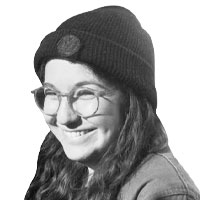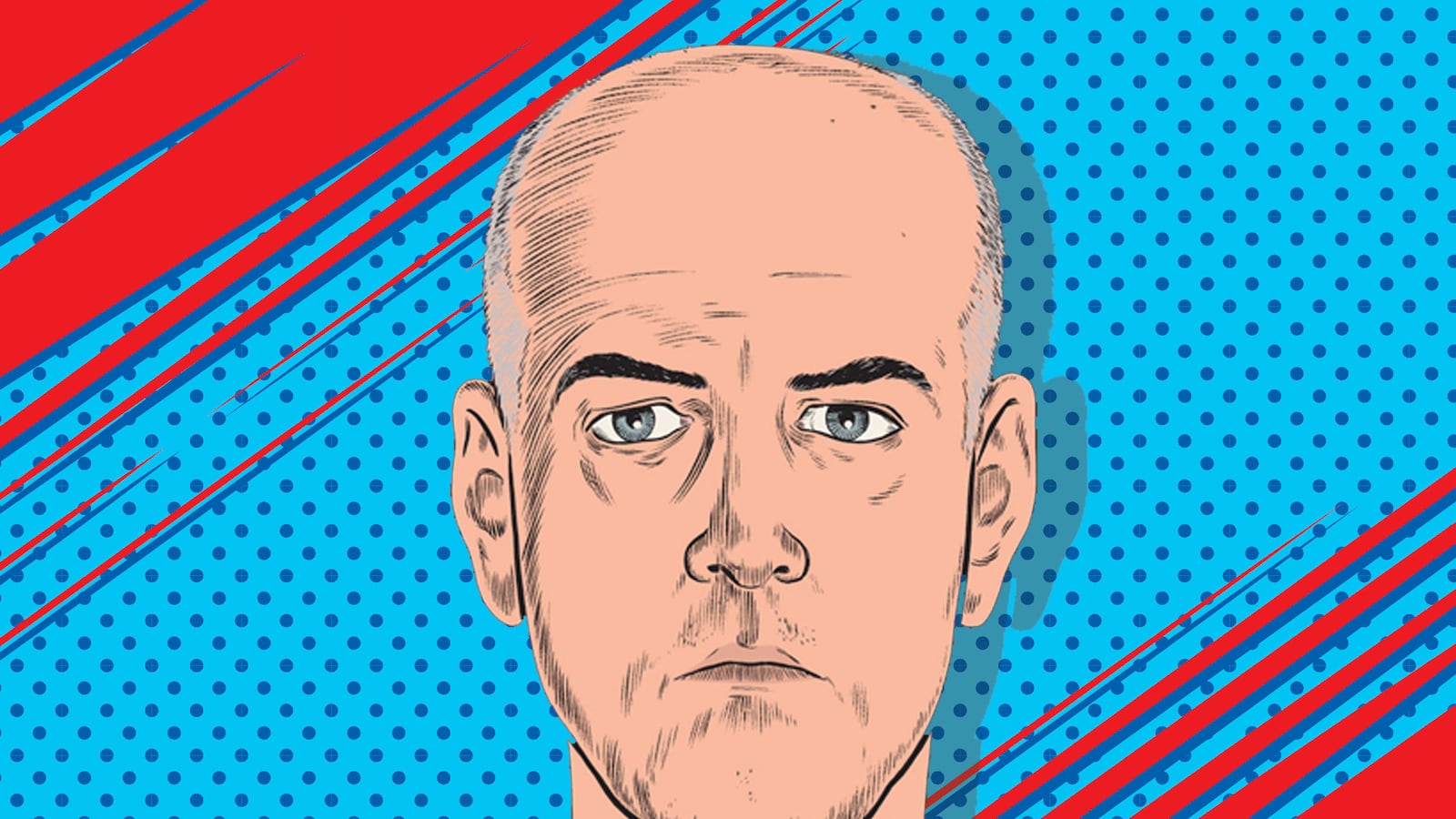Lanky and gregarious, Daniel Clowes sat before a blown-up back cover image of his 2016 graphic novel Patience on the wall of Galerie Martel. The Parisian gallery, dedicated to comics and illustration, is hosting a show of his original works through March 11. Not having sold original drawings for years (there is plenty of work he won’t part with, and plenty already in private institutions), his selection for the show pulled from his own miscellany.
“I imagine after I die my son will throw it into a dumpster: ‘What do I need this paper for?!’” he joked. “So I went through it.” The displayed drawings are mainly culled from the last 17 of his 32 years as cartoonist. The eclectic assortment includes a portrait of Don DeLillo for GQ magazine from 2016; a sketch for the upcoming Criterion DVD cover of Ghost World, which earned Clowes an Academy Award nomination for Best Adapted Screenplay in 2001; original lettering for the titles of his second cinematic collaboration, Art School Confidential; complete pages of David Boring from 2000 (sampling from page 57: “Please don’t go into your doomsday routine right now ok?”), and a color sketch for the 2003 Japanese edition of the Velvet Glove cover.
An elliptical biography: The 55-year-old, Chicago-born Clowes graduated from Pratt, and threw himself into alternative comics in 1985 with Lloyd Llewellyn about a private detective. In 1989 he created Eightball, a showcase of serialized narratives (including Ghost World and David Boring)—which was recently reassembled as a completist two-volume set timed for its 25th anniversary. Clowes’s work has graced covers of The New Yorker, and he received the PEN Literary Award for Graphic Literature in 2011. He lives in Oakland, California, with his wife and son (the very one who might one day dispense of his father’s lawless archives).
Original comics became valuable on the art market only recently. “All of us doing comics thought that there was a value to the work we were doing that was not appreciated,” Clowes recalls. “Years ago, the artwork was thought of as this kind of disposable part of the process and the final work was the printed book. In fact, they used to just cut up the artwork, throw it away, use the back of it… it was treated with utter contempt.” He noted that the reverence accorded to the comic book in France, aka the bande dessiné, “has been way ahead of everybody else.”
Clowes himself delights in the scrappy beauty of the early drafts. “Whenever I’ve seen the original artwork of comics I love and feel connected to, it is as magical as seeing a Vermeer painting,” he says. “You feel in the presence and aura of this artist who’s made this creation.”
His rich roster of characters double only vaguely as alter egos: “I don’t know that the events of their lives are necessarily mine,” he cautions. “They’re certainly not the wholeness of what I am. But there’s always some emotional resonance… I write out the things I’m thinking about all the time.” With Patience, released last year—billed as a science-fiction time-traveling love story—he wrestled with “my younger self and how I became myself now from this younger man.”
Throughout his work, the key thing for him is expressing things askance, with tongue in cheek: “I love irony. I think it’s almost the only way to express the truth. Sincerity always feels false in some way, but irony can be blunt and dance around that edge of what is sincere and what is a mockery of being sincere. I find the closer you get to that edge, the more interesting it is.”
Although Clowes values the rather “auteur” quality of comics, he has recently reconsidered the medium as a potentially galvanizing tool during such a deeply fraught political moment. “It’s something I really have been thinking about, constantly, since our horrible event,” Clowes says, alluding to the last election. He admits that collective political reality is “not my usual mode.” He half-joked that “I have no interest in catering to any world but my own.” But then he pivots to say, “Whatever I do for the next five or more years will be very much about this, because it’s all I think about. I’m trying to figure out the way to do it that feels like it will have some power. I don't know that I can change anybody’s mind, but I want to do something that lasts and is resonant to the people in the charred future.”
The political landscape in the U.S. has so reshaped the vision of the world that he’s not harboring any anger for anyone on the same political side in these incredibly divisive times—not even against Shia LaBeouf, who in 2013 was accused of plagiarizing Clowes’s 2008 comic Justin M. Damiano. Although Clowes hasn't seen LaBeouf’s anti-Trump installation, being anti-Trump is in and of itself enough to bond people together, he thinks. At least for now. “I look forward to the day we can go back to hating Shia LeBeouf,” Clowes deadpans.
Clowes’s next big splash is the movie adaptation of his 2010 graphic novel Wilson, coming out this year. He wrote the screenplay, but it is otherwise the least involvement he’s had so far in a film based on his work. He explains: “The reason I got into making films was that I was isolated. I’m drawing in this room all day every day… I wanted to see what it’s like to collaborate with other people.” (He clarifies: “I didn’t want to collaborate on my comics—that’s my sanctum. Those are always mine; I don’t want to ever pollute that with anything else.”) The reality of movie-making dimmed the shine of collaborating, however. “On Ghost World I was working on the movie as it was being made, and I found it really frustrating. You have to get up at 5 in the morning and work all day. I couldn’t be creative at all. I was half-awake and not making my best decisions—nobody was! You’re just under such pressure that it’s difficult to do something that’s exactly what you want it to be. So I’m back to writing the screenplays in my room, exactly as I was doing with comics!” he laughs. “And I just realized that’s my thing—I do my own thing by myself, and hand it off.”
Cleaving the writing from the production prevents him from feeling precious about the original material: “I give them the template, and they make the film.” Clowes enjoys being able to be a spectator. “Often I’m the only one laughing in the theater—I know all the jokes behind it. I get perspective on my own work.” Ultimately the film, he says, “is not mine.”
The fragmentary nature of Wilson was “kind of useful; it was like an outline. The book is bullet points. He can't really talk to himself as much—that honestly just seems crazy in a non-cartoon character. I had to give him people to talk to.” The result: “It’s much more of a comedy than the book is, but I like that.”
Knowing the range his pop culture collaborations, from a poster for Todd Solondz’s Happiness to the Ramones' music video “I Don’t Wanna Grow Up,” it seems only natural to query whether he has any wishful pop culture collabs. “Like work with Beyoncé?” he responds. He thinks on who might be of interest but circles back to Beyoncé. “Plant that in the press,” he advises.






